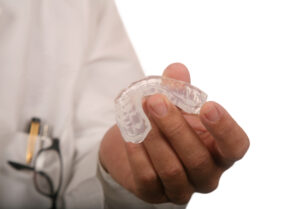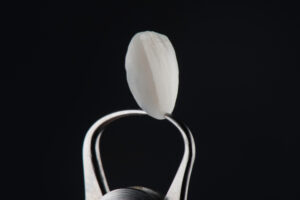Should I Wear a Nightguard if I Have Veneers?
 Porcelain veneers are a wonderful investment in a beautiful smile. At Designer Smiles, Dr. Ann has created thousands of designer smiles using porcelain veneers. It is our goal that any cosmetic dental treatments we perform provide you with many decades of a confident and naturally beautiful smile that you love.
Porcelain veneers are a wonderful investment in a beautiful smile. At Designer Smiles, Dr. Ann has created thousands of designer smiles using porcelain veneers. It is our goal that any cosmetic dental treatments we perform provide you with many decades of a confident and naturally beautiful smile that you love.
Just like any significant investment, maintenance is required for long-term success.
What Does a Nightguard Do?
Nightguards come in all shapes and sizes, materials and manufacturers. You can find them over-the-counter at your pharmacy or grocery store, and you can receive a prescription for a custom-made appliance from your dentist. While some nightguards have unique designs to meet specific requirements of the prescribing doctor, in general, they all function to perform these important purposes.
- Nightguards cover the teeth and separate upper and lower teeth, protecting them from damage by the heavy forces and friction of bruxism (the official term for clenching and/or grinding).
- Nightguards, by that separation, prevent the jaw muscles from fully contracting and therefore reduce the amount of force or pressure they can produce.
- Nightguards decompress the jaw joints and protect the TMJs from the damage of bruxism.
- Nightguards act as a retainer for the teeth they cover and prevent them from relapsing into a formerly crooked position.
How Do I Know if I Clench or Grind My Teeth?
 Many people suffer from symptoms of bruxism, so they know they clench or grind while they are sleeping. These symptoms may include headaches or facial pain upon waking, a feeling of tightness or muscle tension in the jaws, generalized sensitivity of the teeth or pain in the jaw joints (TMJs). Others are heavily clenching or grinding without having any idea they are doing so. This is both good and bad. Obviously, it is good to not suffer from symptoms. It is bad, though, because it may allow you to miss a problem.
Many people suffer from symptoms of bruxism, so they know they clench or grind while they are sleeping. These symptoms may include headaches or facial pain upon waking, a feeling of tightness or muscle tension in the jaws, generalized sensitivity of the teeth or pain in the jaw joints (TMJs). Others are heavily clenching or grinding without having any idea they are doing so. This is both good and bad. Obviously, it is good to not suffer from symptoms. It is bad, though, because it may allow you to miss a problem.
The good news is that if you do clench or grind your teeth, it will leave visible evidence inside the mouth that Dr. Ann will be able to spot. If you are not sure whether you clench or grind your teeth, ask her at your next visit. She will look for signs like the following.
- Flattening or shortening of the teeth from friction, called attrition
- Notching in the teeth near the gums, called abfraction
- Generalized gum recession
- A white callous line inside the cheeks at the level of the teeth, called a linea alba
- Scalloping of the sides of the tongue where it touches the inside of the teeth, sometimes referred to as a “pie-crust tongue”
- Enlarged muscles in the cheeks and temples
Why are Veneers at Risk?
The heavy forces of bruxism can damage natural teeth, causing shortening or flattening, chipping, and fractures. Porcelain veneers are at a particularly high risk for damage from clenching and grinding for several reasons.
Porcelain Veneers are Thin
 In order to conserve your natural, healthy tooth structure while improving your smile, we remove the minimum amount of enamel required for porcelain. Porcelain veneers can be as thin as a contact lens. While we would not call them “weak”, they are certainly delicate. The way that we bond them to the enamel does add strength, so they are not as likely to break on your teeth as they are outside the mouth.
In order to conserve your natural, healthy tooth structure while improving your smile, we remove the minimum amount of enamel required for porcelain. Porcelain veneers can be as thin as a contact lens. While we would not call them “weak”, they are certainly delicate. The way that we bond them to the enamel does add strength, so they are not as likely to break on your teeth as they are outside the mouth.
Porcelain Veneers are Brittle
Porcelain is a type of glass, and like glass, it is brittle. It maintains a great level of strength, even to the extent of damaging teeth that grind against it. However, its brittleness puts it at risk for chipping or cracking under heavy forces. Unlike natural teeth, which may gradually flatten under the forces of bruxism, porcelain will typically crack or break.
Porcelain Veneers Partially Cover the Teeth
Again, to conserve tooth structure, a veneer only covers the visible portion of the teeth. This means it covers the side facing the lips and cheeks, the biting edge, and overlaps a small portion of the biting surface. This helps preserve the strength of your underlying teeth, but it does not strengthen the veneer itself. We would rather protect your natural teeth than porcelain, but we want you to understand that veneers have a higher risk for breaking under heavy forces.
So Should I Wear a Nightguard if I Have Veneers?
The bottom line is YES, you should wear a nightguard if you have veneers. You have invested a significant amount of time, effort, and money into your new smile. Just as you must brush and floss the teeth with veneers to protect them against cavities and gum disease, you should also wear a nightguard to protect them against bruxism.
The simple, and relatively inexpensive, dental appliance can save you thousands of dollars in veneer repairs, as well as a lot of time in the dental chair.
Will an Over-the-Counter Appliance Protect my Veneers?
Great question, and we have a slightly roundabout answer for you. In general, over-the-counter mouthguards provide far less protection than a custom-made acrylic nightguard from your dentist. Their generic fit and moldable material does not reduce the forces of clenching or grinding, and in some cases, it can actually increase your muscle force. Many people find that they will grind right through an OTC nightguard in less than a month.
Would we choose your wearing an OTC appliance over wearing no coverage on the teeth at all? Yes. While the over-the-counter appliance is far less protective and may only last a few weeks, it does separate and cover the teeth. This makes it better than nothing.
The best long-term plan for protecting veneers is consistently wearing a custom-fitted, hard acrylic nightguard made by your dentist from a perfect replica of your teeth. We understand that these are more expensive than over-the-counter options, and they provide better protection for far longer. When you invest in porcelain veneers, that investment includes protecting it with the best nightguard.
More Questions about Nightguards and Veneers?
Call Designer Smiles to schedule a consultation with Dr. Ann. She has created thousands of beautiful new smiles with porcelain veneers, and she has followed these smiles for many years of follow-up evaluations. She knows the various risks for damaging them and can help you understand your particular risk factors. We love helping our patients enjoy their designer smiles for years and years.
